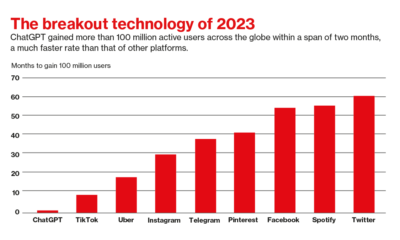Politics
The Next Generation Of Leisure: Building Personalized Travel Experiences With Generative AI
Published
1 year agoon
By
Drew Simpson
After enduring a nearly three-year stand-off with travel restrictions and border closures due to the global pandemic, last year saw travelers take back to the skies, seas, roads, and railroads in droves as countries reopened and welcomed back foreign visitors.
Amid the pent-up travel demand, more than 900 million tourists made an international trip last year. Although the figure only represents 63% of pre-pandemic levels, estimates by the United Nations World Tourism Organization (UNWTO) predict that global tourism could considerably improve, approximately reaching 80% to 95% of pre-pandemic levels in 2023.
Despite ongoing economic problems, and travelers left paying way more for flights, hotels, excursions, and car rentals, demand has been growing steadily as the global tourism industry rebounds from years of shutdowns.
The growing potential of full recovery has prompted the industry to improve and adapt new technology in an attempt to meet traveler needs and cope with increasing demands. With the introduction of several advanced systems, including Artificial Intelligence (AI), machine learning (ML), and natural language processing (NLP) companies and travel agents are now able to closely monitor traveler trends and enhance the overall travel experience from booking to checking in.
What Is Generative AI?
An overarching branch of technology that has in recent years changed the way consumers, and travelers, book and plan their holidays is partially due to the growing development of generative AI.
Generative Artificial Intelligence is a broad term that refers to several categories of AI algorithms that can help to generate new texts, images, audio, code, and synthetic data. These outputs are delivered through deep machine learning networks that use a wide range of data points to compile and deliver different outputs based on the request.
Perhaps the most notable trend in generative AI is the recent release of ChatGPT, a natural language processing tool developed by software and technology firm, OpenAI. The ChatGPT model uses language input models that can help to answer questions, and assist with different language or text-based tasks, including composing emails, essays, and code.
Initially launched in November 2022, ChatGPT managed to garner more than one million users in five days, making it one of the fastest-growing applications by user growth.
Generative AI may perhaps still be in its infancy, but analysts predict that by 2025, these systems will produce 10% of all data. By the same time, generative AI will be used to discover 50% of drug discovery and development initiatives; and by 2027, 30% of manufacturers will use this technology to enhance their product development effectiveness.
These predictions, coupled with ongoing development and user interest show how human ingenuity has allowed businesses and companies to utilize advanced technology to improve customer engagement, experience, and overall satisfaction.
Generative AI In Travel
AI and its components are nothing new to the travel industry, as research shows that 30% of hospitality and similar companies are already using some form of AI to help them improve sales, websites, and product personalization.
We already see this sort of technology in travel with advanced personalization, AI travel assistants, AI-driven applications for flight forecasting, chatbots and online direct messaging, and data analysis that monitors travel trends.
As these and other systems mature as the industry recovers, providing real-world solutions for travelers and companies, how can generative AI become the next disruptive tool that helps to improve the travel experience and creates more personalized travel adventures?
Automated Booking Upgrade Processing
It’s estimated that in 2023, roughly 700 million people will be making a booking online. Furthermore, around 83% of American adults that plan to travel this year, will book their trip through an online platform or portal.
Generative AI provides direct and seamless communication, and for companies in the travel and leisure industry, this presents them with an opportunity to utilize direct and targeted messaging to reach the right consumer market at the right time.
Instead of relying on prompted digital ads and banners on websites, companies will now be able to direct communication with several different audiences at the same time. This will be more prevalent among companies in the airline, cruise, and hotel industries, offering customers an upgraded experience at any given touchpoint.
Generative AI will reach customers using the words and language most associated with the customer journey. This would take big data analysis to a whole new level, where companies can reach their customers with language segments associated with their travel experience.
Building Better Customer Loyalty Programs
Answering customer needs, and providing the right solutions can help companies turn paying clients into loyal followers. As part of their efforts to build a more tactile customer loyalty program, that effectively utilized customer data to profile travelers, generative AI will be able to create a full portrait of the traveler.
Through these efforts, booking sites and travel aggregators will have an informed view of their customers and can predict when a traveler becomes increasingly disengaged from the loyalty program. This could help them prompt new or different deals and marketing campaigns that can help keep travelers engaged and interested.
As more data is collected from travelers, companies will have the ability to formulate personalized rewards and incentives helping to increase customer engagement accuracy. These efforts are already active with the use of chatbots and direct messaging on websites, which is a common way for businesses to resolve customer problems and answer queries.
Better experiences and more personalized targeting would help to automatically increase overall customer involvement, leading to more loyal supporters and travelers.
Direct Marketing Communication
As more customer data and information is compiled, the easier it will be to deliver targeted marketing communication efforts to customers based on their experiences and interactions.
In the travel industry, generative AI will be able to use these algorithms as part of an effort to build a more personalized travel itinerary for customers based on their needs and direct language input. This would mean that customers will automatically be placed in a customer loyalty program dedicated to similar products and services.n
Instead of having customers search for a specific destination, only to review the results and never return, generative AI will target these customers based on their interests, and provide them with a more informative itinerary
These AI models can deliver direct marketing communication to any type of customer, allowing companies to offer the right set of products or services to customers throughout the entire journey.
Virtual Customer Services
A large majority of customer service these days is resolved online whether it’s through email, instant or direct messaging, or ChatBots. These applications have allowed businesses to have direct contact with the customer at all times, and ensure that when a problem occurs, artificial intelligence can use core language processing to resolve any grievances.
The next step would be to introduce a more humanoid or robotic customer service experience, eliminating humans from the chain of interaction, and allowing AI to generate possible solutions for customers.
In some instances, researchers have found that travel and leisure entities such as hotels, restaurants, and booking sites are completely digital, minimizing the need for human contact and delivering constant on-demand service.
In the travel industry, customer service cannot be ignored. Research shows that around 81% of customers that had a positive customer service experience are likely to make another purchase. Even more, around 76% of customers want to interact or talk to a company representative upon contacting a company.
This is where generative AI becomes important to oversee and analyze customer experience only, presenting them immediately with the right information they require, and resolving possible issues they may encounter along the way.
Planning And Booking Assistance
Paired with the importance of virtual customer service, and dedicated online communication – assisted planning and booking is another category where generative AI can be applied.
Companies are already experimenting with different ways they can deliver the right products and services to the right travelers throughout their planning and booking journey. With the assistance of generative AI, customers will in most instances have on-demand access to the services they need and desire.
Travelers booking holidays will be automatically directed to several different experiences or excursions at their destination. They will be offered hotel and car rental deals, discounts, and loyalty program offers specifically tailored to their holiday needs.
There will be an increasing number of direct communication efforts between companies and travelers through mobile messaging apps such as Whatsapp or Facebook Messenger to help keep customers informed about upcoming trips, reservations, or any possible changes.
Adapting to the traveler’s itinerary will mean that chatbots on booking sites will immediately deliver answers or results related to specific queries. Customers will no longer need to contact a service desk, as all the information they require will be available to them on demand.
The Bottom Line
It’s quite interesting to think how much Artificial Intelligence has already done for the travel industry. Now with the introduction of new software and technology, travel companies can direct their efforts towards a more empowered and improved customer journey, from planning to booking to checking in.
Generative Artificial Intelligence offers travelers a more personalized experience that puts them in direct contact with the right services and products and helps to make the entire journey more seamless. Providing customers with the right options not only shortens their time spent planning and booking, but it can also help to create more loyal and trusted customers in an industry bound for recovery.
Published First on ValueWalk. Read Here.
Featured Image Credit: Photo by Spencer Davis; Pexels; Thank you!
You may like
-


Navigating a shifting customer-engagement landscape with generative AI
-


Medical microrobots that can travel inside your body are (still) on their way
-


Making an image with generative AI uses as much energy as charging your phone
-


Finding value in generative AI for financial services
-


This company is building AI for African languages
-


The Download: what is death, and jailbreaking generative AI
Politics
Fintech Kennek raises $12.5M seed round to digitize lending
Published
7 months agoon
10/11/2023By
Drew Simpson
London-based fintech startup Kennek has raised $12.5 million in seed funding to expand its lending operating system.
According to an Oct. 10 tech.eu report, the round was led by HV Capital and included participation from Dutch Founders Fund, AlbionVC, FFVC, Plug & Play Ventures, and Syndicate One. Kennek offers software-as-a-service tools to help non-bank lenders streamline their operations using open banking, open finance, and payments.
The platform aims to automate time-consuming manual tasks and consolidate fragmented data to simplify lending. Xavier De Pauw, founder of Kennek said:
“Until kennek, lenders had to devote countless hours to menial operational tasks and deal with jumbled and hard-coded data – which makes every other part of lending a headache. As former lenders ourselves, we lived and breathed these frustrations, and built kennek to make them a thing of the past.”
The company said the latest funding round was oversubscribed and closed quickly despite the challenging fundraising environment. The new capital will be used to expand Kennek’s engineering team and strengthen its market position in the UK while exploring expansion into other European markets. Barbod Namini, Partner at lead investor HV Capital, commented on the investment:
“Kennek has developed an ambitious and genuinely unique proposition which we think can be the foundation of the entire alternative lending space. […] It is a complicated market and a solution that brings together all information and stakeholders onto a single platform is highly compelling for both lenders & the ecosystem as a whole.”
The fintech lending space has grown rapidly in recent years, but many lenders still rely on legacy systems and manual processes that limit efficiency and scalability. Kennek aims to leverage open banking and data integration to provide lenders with a more streamlined, automated lending experience.
The seed funding will allow the London-based startup to continue developing its platform and expanding its team to meet demand from non-bank lenders looking to digitize operations. Kennek’s focus on the UK and Europe also comes amid rising adoption of open banking and open finance in the regions.
Featured Image Credit: Photo from Kennek.io; Thank you!
Radek Zielinski
Radek Zielinski is an experienced technology and financial journalist with a passion for cybersecurity and futurology.
Politics
Fortune 500’s race for generative AI breakthroughs
Published
7 months agoon
10/11/2023By
Drew Simpson
As excitement around generative AI grows, Fortune 500 companies, including Goldman Sachs, are carefully examining the possible applications of this technology. A recent survey of U.S. executives indicated that 60% believe generative AI will substantially impact their businesses in the long term. However, they anticipate a one to two-year timeframe before implementing their initial solutions. This optimism stems from the potential of generative AI to revolutionize various aspects of businesses, from enhancing customer experiences to optimizing internal processes. In the short term, companies will likely focus on pilot projects and experimentation, gradually integrating generative AI into their operations as they witness its positive influence on efficiency and profitability.
Goldman Sachs’ Cautious Approach to Implementing Generative AI
In a recent interview, Goldman Sachs CIO Marco Argenti revealed that the firm has not yet implemented any generative AI use cases. Instead, the company focuses on experimentation and setting high standards before adopting the technology. Argenti recognized the desire for outcomes in areas like developer and operational efficiency but emphasized ensuring precision before putting experimental AI use cases into production.
According to Argenti, striking the right balance between driving innovation and maintaining accuracy is crucial for successfully integrating generative AI within the firm. Goldman Sachs intends to continue exploring this emerging technology’s potential benefits and applications while diligently assessing risks to ensure it meets the company’s stringent quality standards.
One possible application for Goldman Sachs is in software development, where the company has observed a 20-40% productivity increase during its trials. The goal is for 1,000 developers to utilize generative AI tools by year’s end. However, Argenti emphasized that a well-defined expectation of return on investment is necessary before fully integrating generative AI into production.
To achieve this, the company plans to implement a systematic and strategic approach to adopting generative AI, ensuring that it complements and enhances the skills of its developers. Additionally, Goldman Sachs intends to evaluate the long-term impact of generative AI on their software development processes and the overall quality of the applications being developed.
Goldman Sachs’ approach to AI implementation goes beyond merely executing models. The firm has created a platform encompassing technical, legal, and compliance assessments to filter out improper content and keep track of all interactions. This comprehensive system ensures seamless integration of artificial intelligence in operations while adhering to regulatory standards and maintaining client confidentiality. Moreover, the platform continuously improves and adapts its algorithms, allowing Goldman Sachs to stay at the forefront of technology and offer its clients the most efficient and secure services.
Featured Image Credit: Photo by Google DeepMind; Pexels; Thank you!
Deanna Ritchie
Managing Editor at ReadWrite
Deanna is the Managing Editor at ReadWrite. Previously she worked as the Editor in Chief for Startup Grind and has over 20+ years of experience in content management and content development.
Politics
UK seizes web3 opportunity simplifying crypto regulations
Published
7 months agoon
10/10/2023By
Drew Simpson
As Web3 companies increasingly consider leaving the United States due to regulatory ambiguity, the United Kingdom must simplify its cryptocurrency regulations to attract these businesses. The conservative think tank Policy Exchange recently released a report detailing ten suggestions for improving Web3 regulation in the country. Among the recommendations are reducing liability for token holders in decentralized autonomous organizations (DAOs) and encouraging the Financial Conduct Authority (FCA) to adopt alternative Know Your Customer (KYC) methodologies, such as digital identities and blockchain analytics tools. These suggestions aim to position the UK as a hub for Web3 innovation and attract blockchain-based businesses looking for a more conducive regulatory environment.
Streamlining Cryptocurrency Regulations for Innovation
To make it easier for emerging Web3 companies to navigate existing legal frameworks and contribute to the UK’s digital economy growth, the government must streamline cryptocurrency regulations and adopt forward-looking approaches. By making the regulatory landscape clear and straightforward, the UK can create an environment that fosters innovation, growth, and competitiveness in the global fintech industry.
The Policy Exchange report also recommends not weakening self-hosted wallets or treating proof-of-stake (PoS) services as financial services. This approach aims to protect the fundamental principles of decentralization and user autonomy while strongly emphasizing security and regulatory compliance. By doing so, the UK can nurture an environment that encourages innovation and the continued growth of blockchain technology.
Despite recent strict measures by UK authorities, such as His Majesty’s Treasury and the FCA, toward the digital assets sector, the proposed changes in the Policy Exchange report strive to make the UK a more attractive location for Web3 enterprises. By adopting these suggestions, the UK can demonstrate its commitment to fostering innovation in the rapidly evolving blockchain and cryptocurrency industries while ensuring a robust and transparent regulatory environment.
The ongoing uncertainty surrounding cryptocurrency regulations in various countries has prompted Web3 companies to explore alternative jurisdictions with more precise legal frameworks. As the United States grapples with regulatory ambiguity, the United Kingdom can position itself as a hub for Web3 innovation by simplifying and streamlining its cryptocurrency regulations.
Featured Image Credit: Photo by Jonathan Borba; Pexels; Thank you!
Deanna Ritchie
Managing Editor at ReadWrite
Deanna is the Managing Editor at ReadWrite. Previously she worked as the Editor in Chief for Startup Grind and has over 20+ years of experience in content management and content development.
